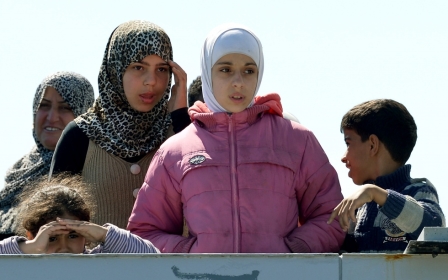Egypt's forgotten Palestinian refugee community

In Fadel Island, a humble village in a remote area of Egypt's Sharqia governorate about five hours by car from Cairo, resides a community of second-generation Palestinian refugees.
The population was about 2,000 when the original refugees fled to Egypt in May of 1948, fearing a similar fate to those who were massacred at Deir Yassin. They crossed the Sinai desert with their camels, carrying simple belongings, and were welcomed by Egypt's government. They were settled in the refugee camp of “Gezirt Fadel” - later to become the village it is today - with a promise to be relocated to a better place soon after.
El-Haj Hemdan - in his early nineties and one of the very few remaining 1948 refugees, with his amazing ability to recall what had happened nearly 65 years ago - told Middle East Eye his story.
“They said it was a matter of a month or two, and we would be relocated to a place closer to the capital," Hemdan said.
"We waited and waited, governments changed, kings fled, presidents died, and nothing happened. After five or six years we abandoned our tents and built houses. But still, some of us retained the hope that we would be relocated to a better place. We didn’t understand the lesson yet: Arabs rarely keep their promises.”
The village is in a state of extreme poverty. All the men of the village support their families by collecting and selling garbage from other villages. The nearest hospital is an hour away. This is a big problem for residents who don’t have any means of transportation. There is no plumbing or sewage system and this creates an extreme challenge for the women of the village, as it is their responsibility to go and get water daily from old fashioned wells in neighbouring fields.
Electricity was installed in the village after former president Mohamed Morsi was elected. In addition to electricity, the Morsi government started to build a hospital near the village, but this immediately came to a halt after he was removed in a military coup. Not only was the hospital's construction stopped by current President Abdel Fattah al-Sisi, but during his first month in power the refugees lost all government support under the pretext that they are not Egyptian citizens. This was an unprecedented act, considering that since 1948 the refugees were treated just like Egyptians, according to locals in Fadel Island.
One of the women in the village, asking to remain anonymous, commented on the move, saying: “It was a dark day for the whole village, we went to get bread from a neighbouring village, [the Sisi government had set up a rationing system, providing five pieces of bread to each person daily] just to be surprised by a newly issued law: no more bread for Palestinian refugees!”
Neither is there a school in the village. The nearest one, like the hospital, is an hour away, and with the average family income being 10-15 Egyptian pounds a day ($2), very few are able to send their children to school. None of the village's students have been able to continue their education beyond high school.
El-Haj Farahat, a local in his late eighties, spoke nostalgically of the days of past presidents. “In the days of [Gamal Abdel] Nasser, we had to renew our papers every five years, and we received aid from the government before Ramadan and before every Eid. Nasser was the best among all the presidents.”
He sighed and continued: “They started to forget about us during the long days of Mubarak. We thought Morsi would improve our conditions, but they removed him before he was able to change anything.”
With the country consumed in political turmoil, and as the government continues its declared war against the Islamists and the activists of the 25 January revolution, it is highly unlikely that anyone will act to improve the situation of the forgotten refugees.
Stay informed with MEE's newsletters
Sign up to get the latest alerts, insights and analysis, starting with Turkey Unpacked
Middle East Eye delivers independent and unrivalled coverage and analysis of the Middle East, North Africa and beyond. To learn more about republishing this content and the associated fees, please fill out this form. More about MEE can be found here.







